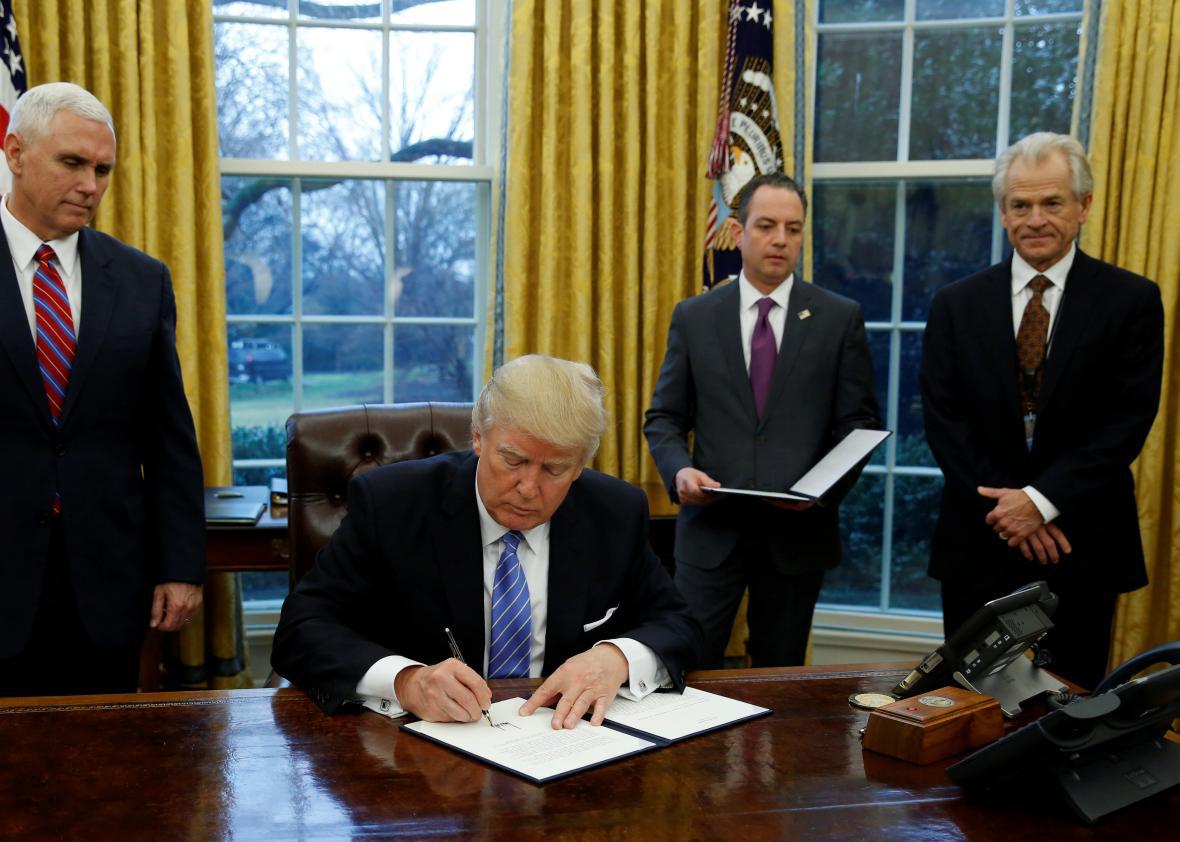As with most subjects, Donald Trump’s thoughts about trade tend to get the most attention when they’re expressed belligerently via Twitter. But some of the White House’s most consequential ideas on the issue have largely stayed out of the headlines, including one that would fundamentally change the structure and meaning of every free trade deal in the future.
The news appeared a few days ago in Politico’s morning trade newsletter, which reported that White House trade guru Peter Navarro told Senate Finance Committee members “that the administration also wants to include a provision that would trigger a renegotiation whenever the United States runs a trade deficit with the partner country.” That’s on top of a previous statement that Trump wants to be able to withdraw from future trade deals with just 30 days notice.
Combined, these two ideas would fundamentally change the nature of trade agreements from semipermanent to entirely provisional. Trade balances fluctuate, often for reasons that have nothing to do with trade deals themselves. Our deficit with Mexico will probably rise a bit the next time oil prices jump up, since we import petroleum from them. That’s not an indictment of NAFTA, yet it could still be used as a pretext to renegotiate the pact under the regime Trump’s people seem to be imagining. The details of our trade pacts would all be written in pencil.
Tacking a self-destruct mechanism onto every U.S. trade agreement would make those deals far less effective at their ostensible goal of promoting commerce across borders. Businesses crave certainty in general, but especially when it comes to trade, because building a global supply chain doesn’t make any sense if it might suddenly be gummed up by tariffs at any given moment. One of the most powerful demonstrations of that dynamic is China. In 2000, the Clinton administration granted the People’s Republic permanent normal trade relations, which ended an annual, largely symbolic ritual in which Congress voted on whether to continue giving China the same trade rights as other nations. Even though the change didn’t actually eliminate any trade barriers, academics have argued convincingly that it caused China’s exports to boom by simply giving companies assurance that tariffs wouldn’t come back. The Trump administration’s idea would have the opposite effect; every time a business debated whether to find a supplier abroad, it would have to weigh the possibility that the rules of the road would change the next time America’s trade deficit figures came in wrong.
But perhaps that’s part of the logic—to write free trade deals in name only that will still discourage factories from moving abroad.
Trump’s trigger would also make the idea of striking a trade agreement with the U.S. less appealing for our potential partners. The Trump administration has already said that its goal with every trade deal will be to improve the country’s overall trade gap, which would mean cutting other countries’ surpluses or putting them at a deficit. Economically, that might not be the worst thing (some countries probably should have smaller trade surpluses). But politically, it makes the optics of choosing to negotiate with the United States pretty awful, at least if you’re a country like Japan that doesn’t already have a deal Trump can threaten to pull out of. By demanding that every free trade deal be renegotiated every time the U.S. runs a bilateral deficit, Trump will make his terms sound all the more worse before negotiators even walk into the room.
There’s also a little bit of unintended irony here. The renegotiation trigger sounds like it’s meant to guarantee that the U.S. works its way toward the best possible agreement for our domestic industries. But if every trade pact can be dissolved hassle-free by both sides in 30 days, as Trump appears to desire, there’s nothing stopping our trade partners from walking away if they feel victimized. If Trump does ever manage to strike a terrific trade deal, it won’t be built to last.
